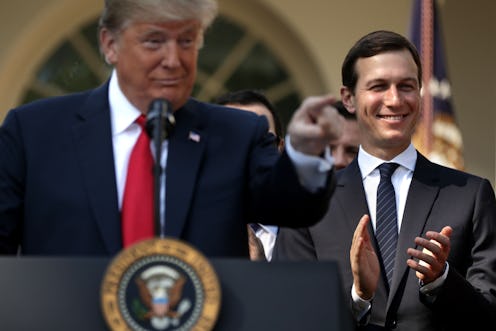News
Here's What Jared Kushner Might've Meant When He Called Trump A "Black Swan"

For a good chunk of America, the term "black swan" conjures up flashes of bloody ballet slippers and Natalie Portman's smoky eye look. But aside from referring to the 2010 award-winner's role, the term also means something else. At CNN's CITIZEN conference on Monday, Jared Kushner called Trump a "black swan," bringing renewed attention to what the terms means.
Kushner, the husband of Ivanka Trump and Trump's son-in-law, serves as an adviser to the president. During the conference, when he was asked about Trump and the likelihood that the impending midterm elections could hurt the Republican Party, Kushner pointed out how the president has been perceived his entire career, CNN reported.
"He's a black swan. He's been a black swan all his life," Kushner told CNN's Van Jones.
Black swan theory, CNN explained, is the idea that there are "high-profile, extreme outliers that defy all known wisdom and expectations." As these people disrupt their field, they can reframe what is to be expected. The concept was first used and described by the scholar and essayist Nassim Nicholas Taleb, according to CNN.
The theory certainly applies to how Trump swept through the 2016 presidential election and defied all expectation to win. In post-election analyses, several outlets concluded there were very few hints that Trump would defeat Hillary Clinton. Nothing in the national polls, swing state polls, fundraising, nor ad spending yielded a clue that Trump would take it all, CNN noted.
Per CNN, Taleb defined what makes a black swan moment in his 2007 book:
First, it is an outlier, as it lies outside the realm of regular expectations, because nothing in the past can convincingly point to its possibility. Second, it carries an extreme impact. Third, in spite of its outlier status, human nature makes us concoct explanations for its occurrence after the fact, making it explainable and predictable.
Kushner's characterization of his father-in-law matches the National Review's claim that Trump flipped all the "old rules" on their heads during the 2016 election. According to the outlet's pundits, the then-candidate rejected “paid media” in the form of traditional television and radio ads and largely took on the onus of spreading the word himself. Trump often blasted out unfiltered tweets and rode the wove of high-frequency media coverage typically attached to celebrities running for office. Trump won the presidential race with a non-traditional campaign that utilized unrelenting political attacks and promised bold moves. He surrounded himself with unorthodox advisers, appointing people like Betsy DeVos, a prior businesswoman with no education experience, as the secretary of education.
In 2015, Trump dominated headlines in the GOP race when he demanded that the wall along Mexico be built and that all 11 million people who were in the country illegally be deported. As the Associated Press reported, it was a position that did not align or follow the Republican Party’s expressed goal of comprehensive immigration reform. His comments, along with so many subsequent ones, was a prelude to the unorthodox way Trump would be and continue to do things.